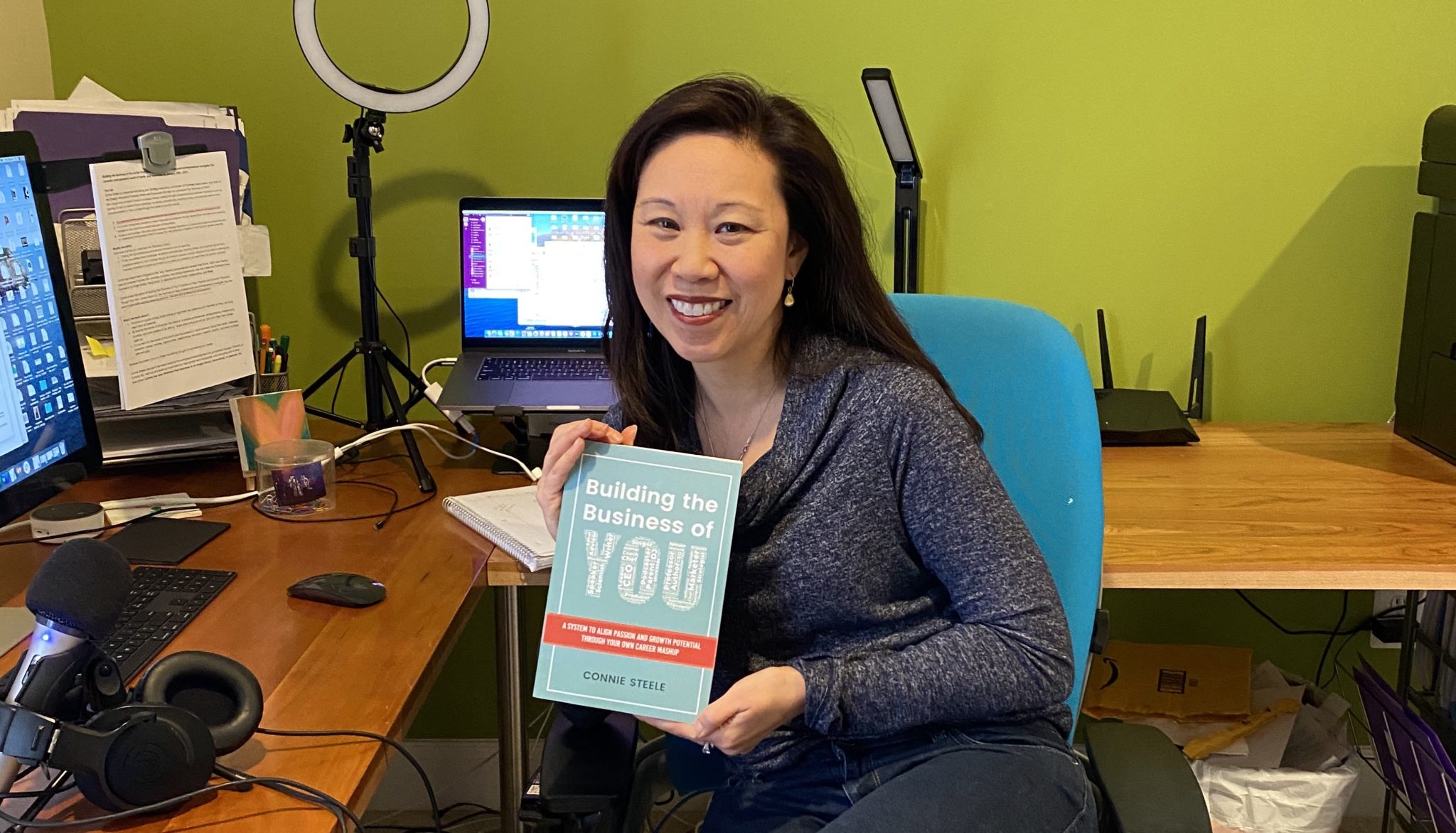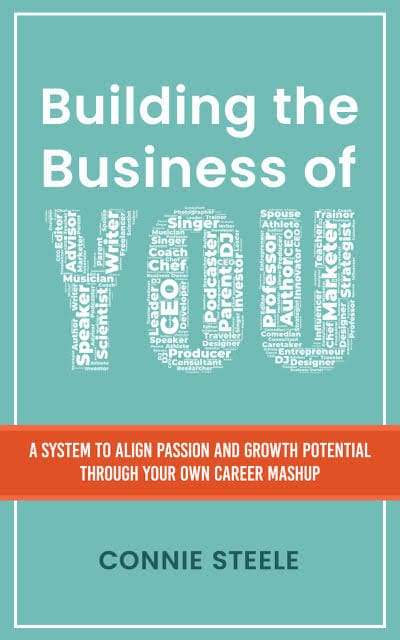
- The App
- Sandboxx News
- Resources
Learn
- Company
About
Become a Partner
Support
- The App
- Sandboxx News
- Resources
Learn
- Company
About
Become a Partner
Support
Connie Steele is the co-founder of Flywheel Associates, a management consultancy in northern Virginia. She is also the creator and host of Strategic Momentum, a...

Connie Steele is the co-founder of Flywheel Associates, a management consultancy in northern Virginia. She is also the creator and host of Strategic Momentum, a podcast that provides tips, stories, and advice from progressive executives and thought leaders on how to reach your full growth potential.
I first met Connie before the pandemic, at a women’s networking event in DC. We quickly found we had a lot in common, and we stayed in touch. When I read the book she is launching this month, I was blown away by it – and I knew it was something every servicemember transitioning out of the military could benefit from (as well as military spouses).

Connie has spent ten years studying workplace trends. Working at Fortune 500, start-up and scale-up organizations, high-growth tech companies, and consulting with C-level executives, Connie has seen firsthand that business isn’t the same as it once was. You don’t necessarily have to start at the bottom and earn your way up; you can start at the top, as CEO of you.
Building the Business of You explores the idea that the dream job isn’t any longer something you get – it’s something you create. The book provides practical tools, research, and anecdotes to help you build yours.
This week, I chatted with Connie about her book, released February 11.

What inspired you to write your book, The Business of Building You?
I’ve always had a desire to understand the “business of work” – what are the factors for success and failure? What holds people back? What pushes people forward? Ten years ago, I had an opportunity to work with a man who was the former CMO of a public tech software company. He chose to leave the corporate career path on his own volition and go independent before that was even common to do. He was, essentially, a gig worker before gig workers became cool.
Work dynamics are changing. When I left my corporate career nine years ago, I couldn’t rely any longer on a linear career path. I had to think outside the box to create my own connections and opportunities. I realized I needed to write a book about this, because a lot of people are choosing non-linear career paths to align their interests, skills, passion and potential. Careers aren’t about conformity anymore. They’re about individuality. This book is meant to create clarity out of the chaos.
On your podcast, Strategic Momentum, you talk to leaders, founders, and entrepreneurs about how they created their own paths to success. Tell us about one of your favorite interviews.
One of my guests, Jon Krinn, started his career in the culinary world, working with famous chefs like Daniel Boulud and Rocco DiSpirito. He won the opportunity to be head chef at 2941, a top restaurant in DC. After years of success and numerous awards, he eventually chose to open his own fine dining restaurant, Inox, in 2008. It opened up to rave reviews.
But the recession hit his business hard, and he decided to pivot. He knew he had the fundamental skills of being a great restauranteur, but there were major gaps; there was a lot he needed to learn about running a business. He didn’t have the money to get an MBA so chose to get real world experience by landing a marketing position at Booz Allen Hamilton, and started a whole new career. He learned about strategic planning, marketing, and relationship management and was also able to leverage the skills he honed in customer relations and leadership in his job. Jon’s passion for the restaurant business never waned so in 2015 he chose to use these strategic planning and marketing skills to open his own restaurant in northern Virginia, called Clarity, while still working at Booz Allen Hamilton!
Today, he is a full-time restauranteur, but he has taken all of his knowledge of business to thrive during the pandemic. Many, many fine dining restaurants have failed over the past year. But Jon was one of the first to shift his business model to serve the new normal. He quickly stood up a takeout website overnight when everything shut down and and adjusted the menu regularly so people would keep coming back. When outdoor dining was allowed, he turned his parking lot into a dining experience. Alternate parking spots were reserved for cars, and the spaces in between were set up with tables, so guests could social distance – an upscale tailgate in a sense. His business did better in 2020 than in 2019.
What does it mean to “be your own CEO?”
It’s about taking control of your career and managing it like a business. Just like a CEO, you have to create a strategy and develop the necessary capabilities to progress in the way you want. Everyone today is a “business of one.” You are a product or service on the web, and people will form an impression of you based on what they find online. So you need to define who you are and what makes you unique. In the case of servicemembers transitioning to civilian life, you probably don’t have a major online presence yet. This is an opportunity to build one the way you want it. This doesn’t just mean putting your name and picture on LinkedIn. It means explaining what you do and why you are unique. You also might want to build a separate website to explain who you are and how you can help people.
Its incredible what you can achieve. But remember you have to adapt to your circumstances. Accept uncertainty and embrace it. Realize that the outcome still may veer left or right, and that’s okay.
Many military servicemembers enter the civilian workforce without a clear idea of what career they will pursue. How can they figure out their path?
First, do some research and analysis. Spot the trends – understand what’s going on at a macro and level in the industries you’re interested in. What’s happening in these industries that makes you interested in them? Read everything you can about them from the companies, technologies, job functions and skills.
Next, do a self-evaluation. It’s the micro-level analysis. What experiences have you had in the past that you really enjoyed? What was it about them that you liked? Was it the job itself, the work environment, or something else?
Third, talk to the people who know you well. Ask your friends, family, former bosses, and peers about what they see as your strengths. Ask them for examples. You are trying to marry the external understanding of you with what you know about yourself.
For example, maybe you’ve managed a lot of projects in the military. You have a skill for bringing people together and coordinating tasks or events. That’s project management, and there are plenty of civilian jobs like that. Maybe you’re also interested in technology. You may think that you aren’t qualified for a technology project management job because you haven’t worked in a company before, but you are more qualified than you think.
Most importantly, don’t just look online for jobs and come across one that “seems right” and then try to fit yourself into that job. There is a strategy to building your ideal career and it involves planning.
Do you have any advice for military spouses?
We’re in a world where you can work from anywhere. You don’t have to worry like the military spouses of ten or even five years ago about how you will maintain a stable career. For so many jobs, all you need is a computer and connection. All over the internet, there are online marketplaces where you can find work – sites like Upwork, HireMyMom.com, and The Mom Project. Even most major consulting firms are hiring freelancers or remote workers right now – everyone from PWC to Accenture to Deloitte. Finding the opportunities won’t be the hard part. The hardest part – and what you need to spend the most time on – is making sure you create the right online presence that truly reflects the value that you can bring to that job. Create an intriguing profile, post a photo, and promote yourself. Remember, you are a product on the web.
You can purchase Connie’s book, Building the Business of You, on Amazon here, and you can learn more about her podcast, Strategic Momentum, here.
Feature image courtesy of Connie Steele on Twitter




